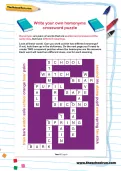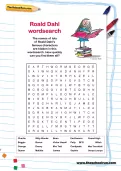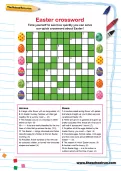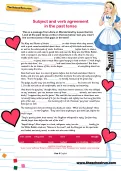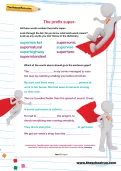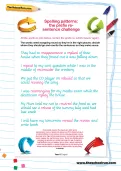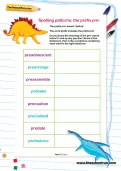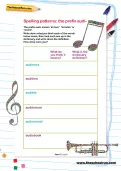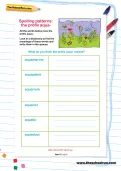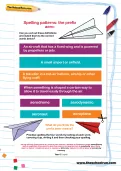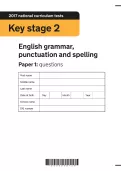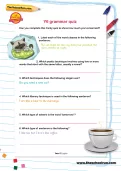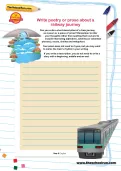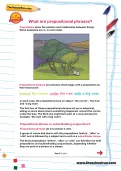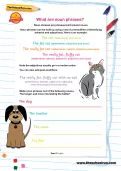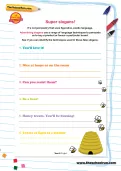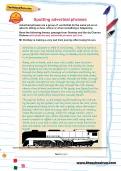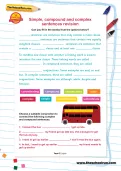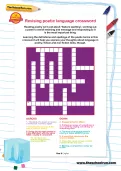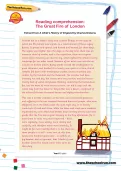Year 6 English worksheets
Free worksheets: Word puzzles, KS2, Y6
You’ll need to login or Register first to access these worksheets for free.
Once you’ve tried out our free worksheets, why not explore all our resources (1000s of worksheets, interactive tutorials, learning packs and more) with a 14-day FREE trial subscription.
Write your own homonyms crossword puzzle
Homonyms are pairs of words that are spelled and pronounced the same way, but have different meanings. Look at these words. Can you work out the two different meanings?
If not, look them up in the dictionary. On the next page you’ll need to create TWO crossword puzzles where the homonyms are the answers. Each word will need two different clues, one for each meaning.
If not, look them up in the dictionary. On the next page you’ll need to create TWO crossword puzzles where the homonyms are the answers. Each word will need two different clues, one for each meaning.
Roald Dahl wordsearch
A fun Roald Dahl wordsearch for primary school children, created by a teacher and featuring the names of Roald Dahl's famous characters!
Witches, foxes, earthworms and more – they're all wonderful characters from Roald Dahl's books. See if you can spot the names of 20 children, villains and creatures from The BFG, Danny the Champion of the world, Charlie and the Chocolate Factory and other Dahl classics in this wordsearch. How quickly can you complete it?
Witches, foxes, earthworms and more – they're all wonderful characters from Roald Dahl's books. See if you can spot the names of 20 children, villains and creatures from The BFG, Danny the Champion of the world, Charlie and the Chocolate Factory and other Dahl classics in this wordsearch. How quickly can you complete it?
Easter crossword
Eggs, buns, flowers and bunnies - and chocolate, of course! Prepare for the school holidays by testing your knowledge of all things Easter-related with this quick crossword.
Writing an informal letter
Have a look at this text message from Jamie to his mum. Does the language sound appropriate? Then see if you can re-write this message as an informal letter. Think about including slang (but no text-speak!), different punctuation and first names.
Formal letter-writing
In the letter below a child is writing to his head teacher to demand justice. Do you think his head teacher will be impressed? Would the writer be more likely to be listened to if he wrote in a more formal style?
Subject and verb agreement in the past tense
This is a passage from Alice in Wonderland by Lewis Carroll. Look at the past tense verbs in the box below. Can you insert the correct ones in the gaps in the text?
Add the missing pronouns
Some of the pronouns from this Alice in Wonderland passage are missing. Can you add them back in?
The prefix super-
All these words contain the prefix super-. Look through the list. Do you know what each word means? Look up any words you don’t know in the dictionary.
Spelling patterns: the prefix re- sentence challenge
All the words in pink contain the prefix re- which means ‘again’. The words need swapping round so they’re in the right places; decide where they should go and rewrite the sentences so they make sense.
Spelling patterns: the prefix pre-
The prefix pre- means ‘before’. The word prefix includes the prefix pre! Do you know the meaning of these pre- words? Look up any you don’t know in the dictionary, then write a sentence containing each word in the right-hand box.
Spelling patterns: the prefix audi-
The prefix audi- means ‘to hear’, ‘to listen’ or ‘sound’. Write down what you think each of the words below mean in the middle box, then look each one up in the dictionary and write down the definition. How close were you?
Spelling patterns: the prefix aqua-
All these words have the prefix aqua-. Look in a dictionary to find the meanings of these words and write them in the spaces. What do you think the prefix aqua- means?
Spelling patterns: the prefix aero-
Can you cut out these definitions and match them to the correct words? What do you think the prefix aero- means?
Key Stage 2 - 2017 English SATs Papers
Help your child prepare for the Year 6 English SATs, taken at the end of Key Stage 2, with some revision and at-home practice. These complete 2017 Y6 SATs past papers are the official past papers from the Department for Education, used in schools.
Write poetry or prose about a railway journey
Can you write a short description of a train journey, as a poem or a piece of prose? Remember to infer your thoughts rather than spelling them out and to include interesting adjectives, adverbs (or adverbial phrases), nouns, similes and metaphors.
What are prepositional phrases?
Prepositions show the position and relationship between things. Prepositional phrases are phrases which begin with a preposition as their head word. Can you identify whether the prepositions before, after and until are functioning as prepositions or subordinating conjunctions in the following sentences?
What are noun phrases?
Noun phrases are phrases built around nouns. Make noun phrases out of the following nouns, the longer and more interesting the better!
Super slogans!
It’s not just poetry that uses figurative, poetic language. Advertising slogans use a range of language techniques to persuade us to buy a product or favour a particular brand. See if you can identify the techniques used in these fake slogans.
Spotting adverbial phrases
Adverbial phrases are a group of words that do the same job as an adverb, telling us how, where or when something is happening. Read the following famous passage Dombey and Son by Charles Dickens and underline any adverbial phrases you find.
Simple, compound and complex sentences revision
Can you fill in the blanks from these options? Then choose a suitable conjunction to connect the following complex and compound sentences.
Revising poetic language crossword
Reading poetry isn’t just about ‘feature spotting’; working out a poem’s overall meaning and message and responding to it is the most important thing. Learning the definitions and spellings of the poetic terms in this crossword will help you express your thoughts about language in poetry, fiction and non-fiction texts, though.
Reading comprehension: The Great Fire of London
Read this extract from A Child’s History of England by Charles Dickens then answer the questions below.
